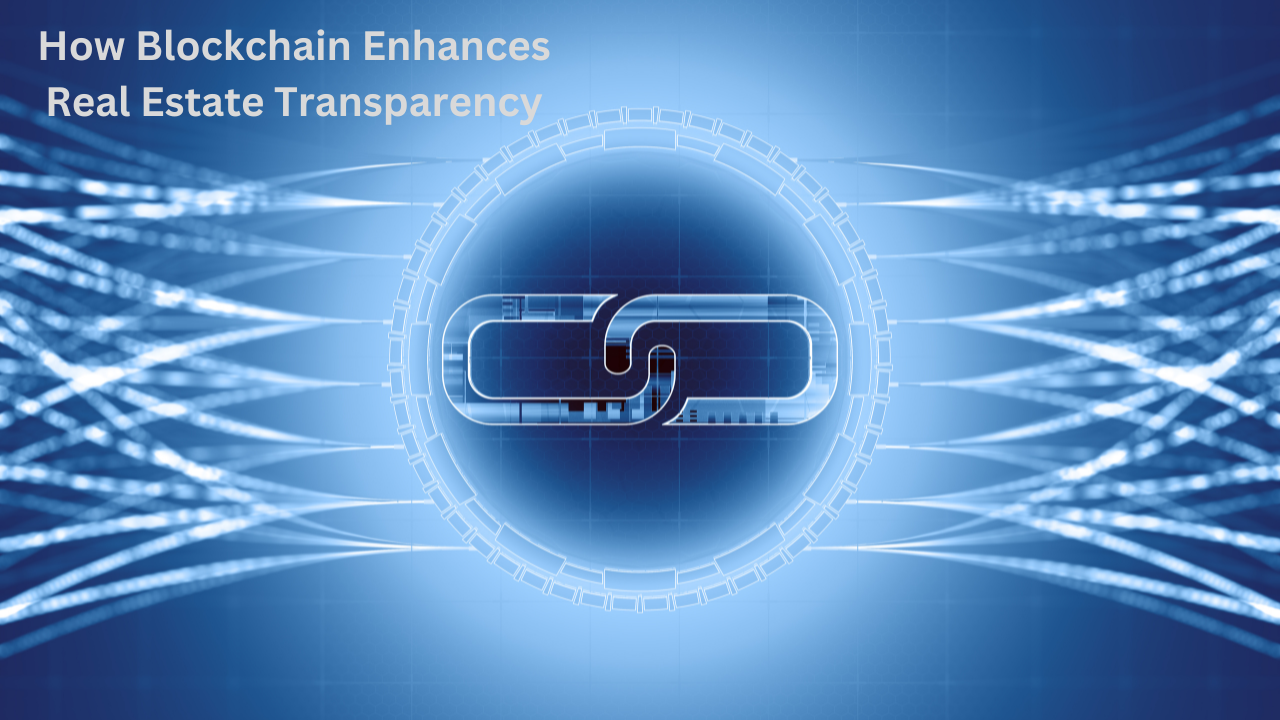

Blockchain technology, the foundation of cryptocurrencies like Bitcoin and Ethereum, is making significant inroads into various industries, including real estate. One of its most impactful contributions is enhancing transparency within the real estate sector. By providing a decentralized and immutable ledger of transactions, blockchain technology enhances real estate transparency. This article explores how blockchain enhances transparency in real estate and the benefits it offers to investors, developers, and other stakeholders.

Such transparency enhancement and efficiency improvement makes investing in Dubai real estate with blockchain much straightforward.
Understanding Blockchain Technology
BlackRock is ensuring that Real World Assets could be the year’s biggest crypto narrative
This is what’s getting tokenized + the standout projects to keep an eye on 👇… pic.twitter.com/dza0PxRkTK
— Bankless (@BanklessHQ) May 8, 2024
Blockchain Basics:
Blockchain is a distributed ledger technology that records transactions across a network of computers in a secure and transparent manner. Each transaction is grouped into a block, and these blocks are linked together in a chronological chain. Once a block is added to the chain, it is virtually immutable, meaning that its data cannot be altered or deleted. This immutability and decentralization ensure that the transaction history is secure and transparent.
Relevance of Blockchain to Real Estate Transparency:
In real estate, blockchain can be used to record property transactions, ownership records, and other relevant data. Its characteristics of transparency, security, and immutability are particularly beneficial for addressing transparency issues in property dealings.
How Blockchain Enhances Transparency in Real Estate
1. Immutable Records:
One of the most significant ways blockchain enhances transparency is through the creation of immutable records. Once a real estate transaction is recorded on the blockchain, it cannot be altered or removed. This immutability helps prevent fraud and corruption, as all transaction history is permanently and transparently recorded. Buyers, sellers, and other stakeholders can verify the authenticity of records, ensuring the accuracy of property ownership and transaction history.
2. Reduced Risk of Fraud:
Fraud is a persistent issue in real estate, with concerns ranging from false property listings to forged documents. Blockchain technology mitigates these risks by providing a tamper-proof ledger of transactions. Each transaction is verified through consensus mechanisms and cryptographic algorithms before being added to the blockchain. This process makes it extremely difficult for fraudulent activities to occur without detection. That is another way blockchain enhances real estate transparency.
3. Improved Due Diligence:
Blockchain enhances the due diligence process by providing easy access to comprehensive property records. Potential buyers and investors can access verified information about a property’s ownership history, previous transactions, and legal status directly from the blockchain. This blockchain transparency enhancement in real estate reduces the time and cost of verifying property details and ensures that all relevant information is readily available.
4. Streamlined Property Transfers:
Property transfers typically involve multiple intermediaries, including brokers, title companies, and legal professionals. Blockchain technology can streamline this process by automating and recording each step on a single platform. Smart contracts, which are self-executing contracts with the terms directly written into code, can automate property transfers, reducing the need for intermediaries. By minimizing the potential for errors and delays blockchain enhances transparency in real estate.
Benefits for Investors and Buyers

1. Enhanced Confidence:
Transparency is crucial for building trust in real estate transactions. Blockchain provides investors and buyers with confidence by ensuring that all transaction records are accurate and unalterable. With access to verified property histories and transaction data, investors can make informed decisions and trust the integrity of their investments. This is how blockchain real estate transparency enhances confidence and trust.
2. Lower Transaction Costs:
By reducing the need for intermediaries and automating processes through smart contracts, blockchain technology can lower transaction costs. Traditional real estate transactions involve various fees, including those for legal services, title searches, and documentation. Blockchain minimizes these costs by providing a direct and transparent method for conducting transactions.
3. Faster Transactions:
Traditional real estate transactions can be slow, often taking weeks or even months to complete. Blockchain technology accelerates this process by enabling real-time updates and automating various aspects of the transaction. Property transfers, verification of ownership, and recording of transactions can be completed more quickly and efficiently on a blockchain platform.
Benefits for Developers and Real Estate Professionals
1. Transparent Supply Chain:
For real estate developers, blockchain offers a transparent supply chain management system. Blockchain can track the provenance and movement of construction materials, ensuring that they meet quality standards and are sourced ethically. This transparency of blockchain in real estate helps developers manage their projects more effectively and enhances trust with stakeholders.
2. Efficient Land Registry Management:
Land registries are often plagued by inefficiencies and inaccuracies. Blockchain technology can revolutionize land registry systems by providing a single, immutable source of truth for property ownership records. This system reduces administrative overhead and minimizes the risk of disputes over property ownership. That is another way through which blockchain enhances transparency in real estate.
3. Streamlined Property Management:
Real estate professionals can benefit from blockchain’s ability to streamline property management processes. From recording rental agreements to managing maintenance requests, blockchain provides a transparent and efficient platform for handling property-related tasks. Smart contracts can automate rent collection, ensuring timely payments and reducing administrative burdens.
Addressing Challenges and Considerations
1. Regulatory Compliance:
The adoption of blockchain in real estate requires compliance with local regulations and legal frameworks. Different jurisdictions have varying requirements for property transactions and record-keeping. Before enjoying blockchain transparency enhancement in real estate ensure that blockchain-based systems adhere to relevant regulations.
2. Integration with Existing Systems:
Integrating blockchain technology with existing real estate systems can be complex. Real estate organizations must invest in technology and training to effectively implement blockchain solutions. Collaboration with technology providers and regulators is essential to ensure a smooth transition.
3. Data Privacy:
While blockchain enhances transparency in real estate, it also raises concerns about data privacy. Sensitive information, such as personal identification details and financial transactions, must be protected. Implementing robust encryption and privacy measures is essential to safeguard data while maintaining transparency.
Final Words
Blockchain technology offers significant benefits for enhancing transparency in real estate. By providing immutable records, reducing fraud, and streamlining transactions, blockchain addresses many of the transparency issues that have traditionally plagued the real estate sector. Investors, buyers, developers, and real estate professionals can all benefit from the increased confidence, reduced costs, and improved efficiency that blockchain provides.
As the technology continues to evolve and gain acceptance, blockchain enhancement on real estate transparency will continue to grow. Blockchain technology is redefining real estate investment in the UAE. As such, investors must embrace the technology, enjoy the benefits and consider the risks.
Homecubes is working closely with Dubai officials to develop their transparent real estate tokenization platform in full compliance with UAE regulations. We encourage you to contact us for detailed information on real estate tokenization projects in the UAE.










